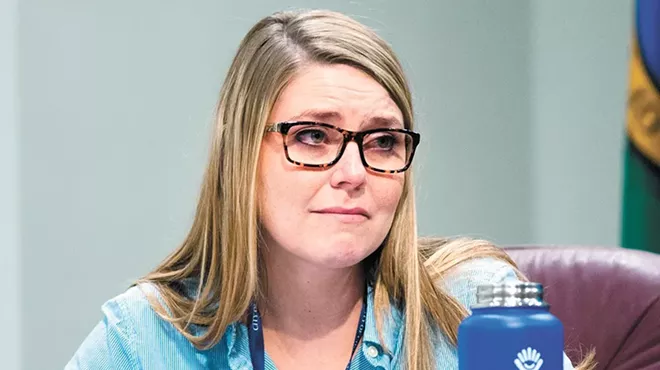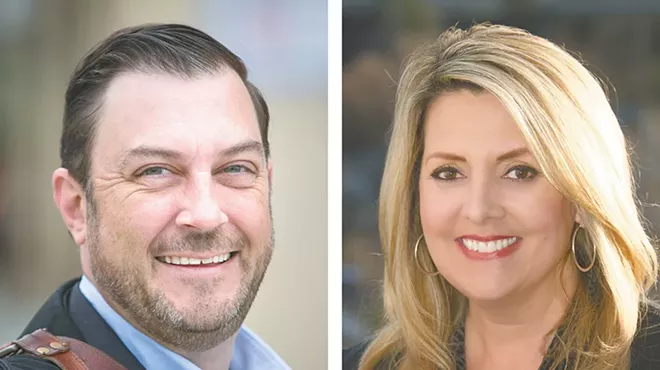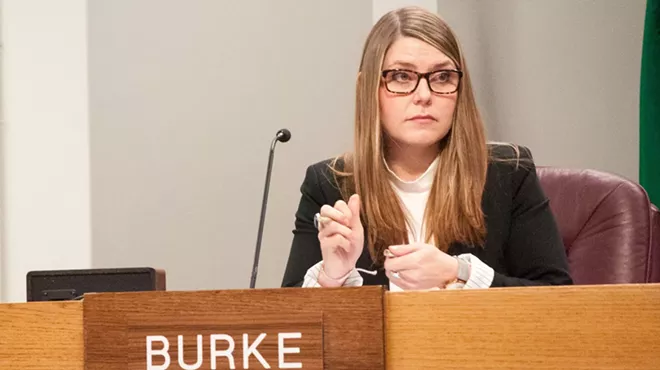
On that day in March last year, Kate Burke has no reason to think twice about letting Richard Rush into her home.
Rush is a friend, a respected member of the community. At first, they talk about recipes and politics. She has political ambitions, and Rush says he can help her with them. He's a prominent local Democrat, a former city councilman and Councilwoman Candace Mumm's legislative aide.
Then he asks her if she trusts him. She says she does.
That's when, according to Burke, he tells her he's lonely because of his recent divorce and suggests they go into her bedroom and "cuddle."
She's horrified. She's 27. Rush is older than her father. She refuses. Then he suggests they ask each other a series of questions from a New York Times Modern Love column that made a couple fall in love. She tells him "no" again. He asks if she wants go on a walk by the river. For the third time, she says no.
Finally — after a long, excruciating hug — Rush leaves. Burke locks the door and hides behind it so Rush can't see her through the window as he drives away. It's her first night in her new house — she hasn't even unpacked yet — and now she feels she never wants to be alone there again.
She tells herself she'll never talk about what just happened.
TELLING SOMEONE
A year and a half later, during the last few weeks of her city council campaign, Burke is sharing this experience at a table at Geno's, the Hamilton Street restaurant. She has the details typed out on a paper in front of her. She wrings her hands and takes deep breaths. Rush wasn't the only man she's felt sexually harassed by, but he's the one who's left the biggest scar.
"It shouldn't be this hard," she says. Her eyes brim with tears behind her glasses. "I didn't even get raped. No one touched me."
Ever since the New York Times reported on the sexual assault allegations against Hollywood executive Harvey Weinstein, thousands of women have gone public with their own experiences about sexual harassment and assault from actors, politicians, journalists, co-workers and friends.
Even before the outpouring of #MeToo stories, Burke told the Inlander she wanted to tell hers. She wanted to talk not only about Rush, but to call out how even well-intentioned people in the community deepened the pain with dismissive reactions.
She says some of the women in her life urged her not to talk or name names. It could hurt your campaign, they say. But to hell with that, she figures.
"How are other women supposed to feel they're supposed to stand up and talk about these things when I haven't?" she says.
In his response to the Inlander, Rush opted not to contest Burke's account, instead offering an apology to the women he's hurt. After all, Burke isn't the only woman who's accused him of harassment.
Neighborhood activist Patricia Hansen also says that Rush got her alone in her house — four days earlier than Burke — by lingering behind after a neighborhood meeting she had hosted. Before he finally left, Hansen says, Rush propositioned her five times, saying he wanted to kiss her, touch her, have sex with her.
"I'm not a big person," Hansen recalls thinking. "I'm probably half his size."
Like Burke, Hansen says the incident made her feel violated. The persistence and the power dynamic pushed it beyond mere creepiness, they both say: It was sexual harassment, the behavior of a predator.
"I decided that — shame on me if I didn't report this," Hansen says.
"It stripped me of my dignity, to tell people. It stripped me of my power, my passion, everything."
At the next city council meeting, Hansen texts City Council President Ben Stuckart, and he immediately sets up a meeting with Human Resources.
Rush is fired after multiple city employees also raise concerns about his behavior. The news is first reported in the Inlander on May 9, 2016. Burke is flooded with emotions. There's sadness and guilt over whether she could have stopped other people from being hurt if she'd said something. And there's frustration with the muted reaction from Democrats.
"We should have made a bigger stink," Burke says. "I guarantee you that if it would have been a Republican, we would have gone crazy."
But the news also gave Burke the courage to finally start telling people what happened. Some reacted with righteous outrage, some with empathy, or by sharing their own experiences.
"Every single woman I've told this story to has told me her story," Burke says. Some of them were about their own uncomfortable experiences with Rush.
Some offered help: Burke says Rep. Marcus Riccelli didn't seem to know exactly what to do, but offered to connect her with other powerful women to discuss the issue, like Sens. Patty Murray and Maria Cantwell.
But others peppered her with questions scrutinizing her behavior instead of Rush's: Why did you let him into your house? Why did you trust him in the first place? Why didn't you see it coming?
"With the questions I got, I could see men thinking less of me after I told them," Burke says. "It stripped me of my dignity, to tell people. It stripped me of my power, my passion, everything."
That's why Burke was scared to tell her boss what happened. As state Sen. Andy Billig's legislative aide, she'd worked hard to prove to him how strong she was. And this made her feel weak.
When she first told him, Burke says, Billig was uncomfortable hearing her talk about Rush, and he told her he didn't want to hear about it.
"Initially, I don't think I understood the gravity of it," Billig says now. But he thought about it more. And after Burke called him and asked him to listen, he reversed course and sought to help her how he could.
But one conversation was hurtful in particular, Burke says. Several weeks after the news broke that Rush had been fired, she called Stuckart, the council president, to share her story.
In an Inlander interview last year, Stuckart said Rush had trouble with boundaries, but stressed what Rush was accused of wasn't officially considered sexual harassment. Stuckart called it all "unfortunate" for both Rush and the people he made uncomfortable.
Burke recalls a similar tone in her conversation with Stuckart: Rush was just an old man and didn't mean anything by it. "It was a horrible reaction," Burke says. "It made me feel like less of a person."
Stuckart recalls Burke raising an incident where Rush made her uncomfortable, but doesn't remember hearing about Rush propositioning her at her house. He says that he immediately went to HR with every concern raised.
"When a complaint is brought forward, I act on it immediately," Stuckart says.
To Hansen, Stuckart had acted decisively. But to Burke, who in 2013 wrote an Instagram post calling Stuckart her "local hero," Stuckart had downplayed her experience. Riccelli recalls seeing her distraught after her phone call with Stuckart.
"I still can't comprehend why those who I thought were my friends chose to stand up for a creepy old predator," Burke says. "All these strong leaders I thought were in Spokane weren't here."
TWISTING THE KNIFE
Burke tried to regain a sense of control. With Billig's help, she emailed Rush, excoriating him and telling him never to contact her again. She co-wrote an account of her experience — without identifying that it happened to her — for an online periodical based in Portland. She joined the YWCA board to fight against domestic violence.
But she faced constant reminders of what had happened to her. The incident with Rush fed her fears that she was just successful because she was seen as pretty — not because of her intelligence and compassion.
And a piece of advice Burke says she got from Stuckart seemed to justify those fears: "You need to learn to use your looks for your advantage."
"If I said 'use it to your advantage,' that was among 20 other pieces of advice I gave her," Stuckart explains. It would have been campaign advice, he says, like telling a tall person to stand a lot.
Stuckart says institutional sexism is a serious issue. It's one reason why he seeks to recruit women for city boards.
"More than likely, somebody's not going to tell a back-room, sexist joke if there's women in the room," Stuckart says.
But Burke says she argued with Stuckart about sexism and sexual harassment, and felt Stuckart wasn't hearing her. "It's like my octave of my voice wasn't going into his ears," Burke says. "I felt really defeated."
She's had other frustrations as well:
After an independent investigation into the handling of sexual harassment allegations against former Spokane police chief Frank Straub was released in July of last year, the city has sought to overhaul its sexual harassment policies, but Burke wants to see more progress.
"That should be the mayor's number one f—-ing priority," Burke says.
In March, City Councilman Mike Fagan threw up a photo on the screen at a Trump rally in Spokane Valley, showing Burke standing beside former President Bill Clinton. "The first thing that came to mind is, 'Hey, where's Bill's hand?'" Fagan told the crowd.
Friends had made similar jokes on her Facebook page.
"I'm like, 'No, f—-er. I'm smart. I'm passionate.'"
"It's never fun to be the butt-end of a sexual harassment joke," Burke says. "And it's happened to me multiple times because of that picture."
And just to twist the knife: Rush was the one who took the picture.
As Burke doorbells for her campaign, she estimates that, about once a block, someone opens the doors and comments on her looks.
"I give them my lit, and they say, 'Oh, you're pretty,'" Burke says. "And I'm like, 'No, f—-er. I'm smart. I'm passionate.'"
She says this doesn't happen to male candidates. Indeed, her city council opponent, Tim Benn, says he can't recall ever having to deal with sexual harassment issues. Employers need to take it seriously, he says, but with him running a daycare center with his wife, it hasn't come up.
IMPACT
Burke has steeled herself for backlash to this article. But she says she wanted to go public anyway — to praise people who do right and call out people who do wrong.
"A personal story can really impact someone else's life," she says.
Last year, Rush responded to the allegations by arguing he hadn't done anything wrong. But now, he strikes a different tone. He writes that he's horrified that he hurt friends and allies.
"No woman should be made to feel this way," he tells the Inlander. "I did not have a clue regarding the impact I was creating. The last thing I want is anyone to fear me."
He asks for forgiveness.
"I have serious soul-searching ahead," Rush says. "If anyone, particularly those with experience and wisdom in this area, has constructive engagement to offer, I welcome it."
Burke has offered her own apologies too, to friends she had treated poorly when they experienced sexual harassment.
"I really thought that only weak women got attacked and raped and sexually harassed," Burke says. "I thought I was so strong and invincible. I thought I could control this from happening to me."
Now she knows that she can't. She can only control what she says about it. ♦


























